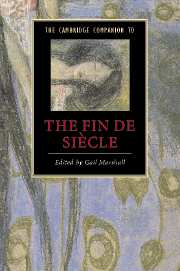Book contents
- Frontmatter
- Introduction
- 1 Psychology at the fin de siècle
- 2 Decadence and aestheticism
- 3 Sexual identity at the fin de siècle
- 4 Socialism and radicalism
- 5 Empire
- 6 Publishing industries and practices
- 7 The visual arts
- 8 The New Woman and feminist fictions
- 9 Realism
- 10 The fantastic fiction of the fin de siècle
- 11 Varieties of performance at the turn of the century
- 12 Poetry
- Guide to further reading
- Index
- Series List
12 - Poetry
Published online by Cambridge University Press: 28 September 2008
- Frontmatter
- Introduction
- 1 Psychology at the fin de siècle
- 2 Decadence and aestheticism
- 3 Sexual identity at the fin de siècle
- 4 Socialism and radicalism
- 5 Empire
- 6 Publishing industries and practices
- 7 The visual arts
- 8 The New Woman and feminist fictions
- 9 Realism
- 10 The fantastic fiction of the fin de siècle
- 11 Varieties of performance at the turn of the century
- 12 Poetry
- Guide to further reading
- Index
- Series List
Summary
Fin de siècle poetry was often both anti-Victorian and anti-bourgeois in spite of the fact that its authors were frequently middle-class Victorians. While Victoria's reign did not end until 1901, during the last quarter of the nineteenth century poetry was moving away from those forms and styles that had come to be considered most quintessentially Victorian. By the time a sense of 'Victorian' values and aesthetics had been recognised and labelled as such, poets were able self-consciously to define their work in opposition to them, sometimes explicitly disavowing any affinity. It is for this reason that the last quarter of the century is often identified with the death of the Victorian aesthetic, and Decadence perceived as the wringing out of the last drops of a faded and over-played aesthetic. Yet, if this was the period in which Victorian poetry died, it was without a doubt the period in which many new poetries were born. In comparison with the lucrative novel, the economic marginality of poetry by this point in the century undoubtedly put it in a different relationship with its recent heritage. Much less likely to be loyal to tried and tested formulas, poetry begins to see itself as avant-garde. What we see in poetry of the period is not so much the limbo of 'transition' to modernist concerns, however, but what Richard Le Gallienne identified as a self-conscious desire for a new aesthetic and a new beginning.
The death of Alfred Lord Tennyson in 1892 can be seen as a symbolic marker of the fate of Victorian poetry. The well-attended funeral demonstrated that many ordinary people, whether or not they read poetry, felt the poet laureate represented something significant about national identity and pride. After Tennyson died, however, the post remained empty until the unexpected appointment of Alfred Austin in 1896.
- Type
- Chapter
- Information
- The Cambridge Companion to the Fin de Siècle , pp. 223 - 240Publisher: Cambridge University PressPrint publication year: 2007
- 7
- Cited by



